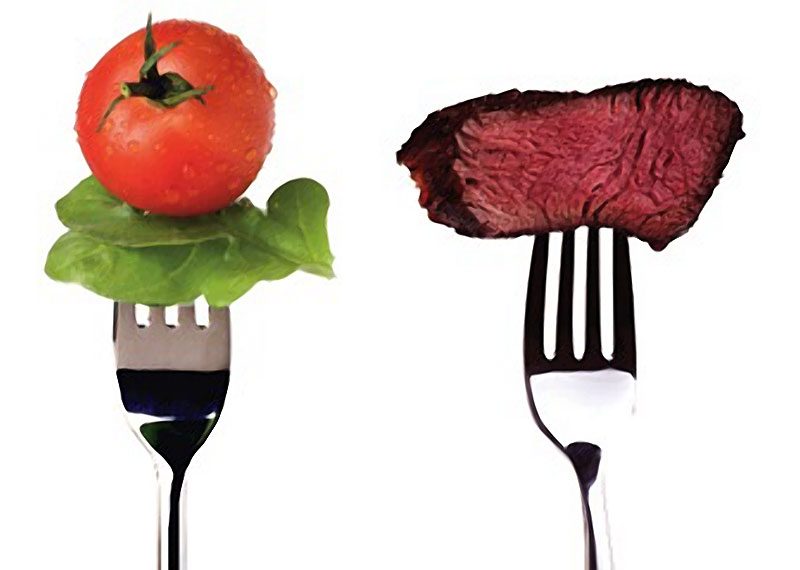Original Purpose of Vegetarianism According to Vedic Culture

Vegetarianism is an example of the application of the value for ahimsa (non-injury). Many arguments in favour of a vegetarian diet can be made, but the basic argument supporting non-flesh eating is simply ahimsa.
In India, where there are more vegetarians than anywhere else in the world, vegetarianism is based on this value alone.
Why is more himsa (injury) involved in eating an egg than an eggplant, or a steak, than a pumpkin?
Every form of life requires food of some kind. One life-form feeds upon another. What is tragedy to the bird is dinner to the cat. This being the case, why is it not acceptable for a human being to also eat meat? Because a human being is not in the same choiceless category as the canary-eating cat, and therefore he cannot use the cat’s example for his justification.
For the cat and other non-human life-forms, what to have for dinner is not a choice. This is not so with the human being whose self-consciousness brings into play a will – free to choose any means to achieve life’s ends, including the basic need, food. Not being pre-programmed, the human being must choose the kind of food he eats.
All living beings have a value for life. Anything alive tries to stay alive, plants and very simple life-forms included. However, it is also plain that all beings do not seem to have the same relative level of awareness of life, the same conscious ability to perceive threats to life or to struggle to preserve life.
Creatures in the animal kingdom are closer to human beings than plants in being aware of threats to their lives and in struggling to stay alive. Animals, birds, fish (all mobile creatures) run away when they know someone is trying to catch them. When they are caught, they struggle and cry.
Therefore, one cannot but know that they do not want to be hurt, and that they want to live. No mobile creature wants to be someone’s dinner. Since one has been given free will to choose one’s food, one must find some norm to guide one in choosing that food.

The gift of free will carries with it a responsibility to follow a dharmic norm for choice of one’s food.
Since one does not want to be an animal’s meal, one should not make an animal his meal.
Plant food, rather than meat, should be one’s choice because many plants seem designed to give up their produce as food for other lifeforms without surrendering their own lives; and even when this usage does destroy the plant, plants appear to have a less conscious appreciation of any threat or harm to themselves than do animals.
If one insists upon including meat in his diet, to raise such a decision to ethical status, one would have to put oneself on the same basis, as other carnivorous animals.
To be on the same basis one should hunt and kill one’s prey bare handed without the assistance of weapons, thus exposing oneself to the possibility of being someone’s dinner while seeking other creatures for one’s own dinner.
If one is not willing to do this, the use of animals for food will be unethical, conflicting with one’s half-value for noninjury. That one has such a half-value is revealed by one’s failure to risk the possibility of suffering the same result.






is veganism traditional to Vedic culture, as well?
Laws of Vedic period (1500-500 BCE; same as BC) allowed consumption of certain meat (don’t know which), however vegetarianism was encourage. EG: Butter was very common.
Manusmṛti book states: No sin in eating meat, however abstention brings rewards. One rewards for example is having developing self-discipline to respect other helpless living creatures by means of ahimsa (non-injury).
For example: there’s essentially no difference between a pig and human. Both are flesh. Except pig has less sophisticated Subtle Body (intellect/emotions), thus can’t think or talk. From one aspect, one could even argue: What justifies a human eating animals, but not other humans, considering both are flesh?
Or, in some countries, eating dogs/dolphins is fine. Yet another, it’s despicable. So whose right?
Of course, above is only one way to look at it. Not absolute, as it’s neither sinful nor meritorious to eat meat. All that matters is individual makes up one’s own mind and doesn’t feel guilty about it (as guilt is one of best indicators that one would benefit by seeking correction in choice/action).
Many plants seemingly being designed “to give up their produce as food for other lifeforms without surrendering their own lives” is an interesting point, and one that I’ve never heard before. It’s doubtful, however, that many vegetarians limit themselves only to those plants that are not harvested in toto, thus giving up their lives.
The argument that “one should hunt and kill one’s prey bare handed without the assistance of weapons” makes no sense. We use our intellect to make and use tools. We have no fur but exist in cold climates because we wear clothing and we substitute sharpened objects for claws and fangs. We support and care for each other in ways no animals do, enabling us to live together supportively, without each fending for themselves and their young for everything. We farm because we have learned to use hoes, plows, and other instruments, to fertilize the earth, and can time when we should plant and harvest.
We are omnivores. Our nature is to eat both plants and animals. Excluding either one is extreme. Even more extreme is arguing humans should not use tools.
If it’s logical that we should only eat critters we can catch in the wild with our bare hands, it would also be logical that we should just gather food without farming done other than digging the ground with our bare hands. It would also be logical that we should only eat fruits, berries, nuts, etc., avoiding all vegetables where the plant is destroyed to garner food.
Indeed. It is point of view, and no way of proving it absolutely.
From another point of view (eg: Ayurveda), vegetables maintain non-agitated mind (sattva-guna), while meat may induce agitation (raja-guna) and heaviness (tama-guna).
It’s also noticed in some (not all) people, the more mind is purified (and still-ified), the more sensitive one becomes to hurting lifeforms, and especially eat them.
It is also noticed, some vegetarians go back to meat eating after some years of discovering body’s requirement. So changes per lifestyle of individual.
End of day, duty of each individual to be sensitive to own body-mind requirement and eat food appropriate to intended values in life. If one values intellectual caliber, and veggies happen to make ideas and memories clearer, then stick with veggies.
If one values energy, and certain protein-rich meat offers that, eat so.
I have developed an inability to eat many plants because they contain oxalates. Oxalates cause 80% of kidney stones. Foods like tomatoes, spinach, raspberries, potatoes, rice, etc. contain too much oxalate for many people. I won’t go into the ugly details of how plants protect themselves, but they do.
I don’t enjoy hunting, but I would certainly do it with no guilt if I couldn’t pay a skilled hunter (or rancher). Most vegetarians don’t grow the innocent plants they kill and eat either. I eat meat because it is good for me and plants have developed deadly chemicals to protect themselves.